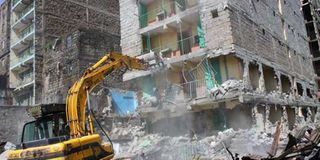Tough new laws bring a ray of hope to industry

A bulldozer demolishes a house near the building that collapsed in Huruma estate Nairobi killing at least 49 people. PHOTO | ANTHONY OMUYA | NATION MEDIA GROUP
What you need to know:
- he noted that the problems in the sector result from incompetence, unprofessional practices and lack of capacity within the institutions responsible for regulating the sector.
- “We are privy to statistics showing that that only 48 per cent of the buildings recently audited met the minimum standards while 52 per cent had defects which could be rectified by the owners,” she said.
- She added that some buildings were found to be extremely dangerous, making it necessary to evacuate the tenants and obtain legal orders to pave the way for their demolition.
The announcement by the government that it is going to streamline the construction industry through tough laws brings hope to a sector, which has been bedevilled by a host of problems.
During a stakeholder’s meeting in Nairobi recently, Land and Housing PS Aidah Munano said: “The new regulations are out and we are publishing and disseminating them to sector actors. It is expected that they will bring about the overdue order, health, safety and harmony in the building industry.”
Ms Munano said the Government attaches great importance to the construction industry, hence its concern about the prevailing rot, which has led to the collapse of buildings, resulting in losses for both the government and developers.
“To underline the government’s seriousness in reversing the tragedy in the sector, President Uhuru Kenyatta has ordered us, policy-makers in the ministry, to set up a special unit to inspect all buildings and to determine their suitability for human occupation,” she said.
She noted that the problems in the sector result from incompetence, unprofessional practices and lack of capacity within the institutions responsible for regulating the sector.
“We are privy to statistics showing that that only 48 per cent of the buildings recently audited met the minimum standards while 52 per cent had defects which could be rectified by the owners,” she said.
She added that some buildings were found to be extremely dangerous, making it necessary to evacuate the tenants and obtain legal orders to pave the way for their demolition.
“The only handicap is that the crooked developers fight back through court injunctions. We also have a problem with working harmoniously with some county governments who, by law, are partners in the building industry. Capacity building structures and defining a clear-cut hierarchy of action between ourselves will pave the way for speedy administrative action that will see errant practices punished to bring an end to the lethargy in this important sector,” she said.
Ms Munano further called on professional bodies to play their rightful role in ensuring discipline in professional matters, emphasising that discipline must be enforced through registered professional bodies such as the Board of Registration of Architects and Quality Surveyors (BORAQS) and the Engineers Regulatory Board (ERB).
She said all construction firms as well as individual expertise/trade must be registered, and must maintain up- to-date NCA classification. .
“Further, all stakeholders in the industry will be required to attend all training organised by the NCA in order to keep updating their skills, capacity building and safety of construction workers,” she said.
Meanwhile, Mr Geoffrey Omwenga, an engineering consultant in town planning, said county governments should be supported with technical logistics to come up with spatial development plans that will create order in development controls, approvals, inspections and issuance of both completion and occupation certificates.
He said the current lapse in law and order in the sector is attributable to the haphazard use of shortcuts, corruption and general deviation from laid-down procedures and standards, adding that the national and county governments should work together to ensure safety and order in the sector.
And Nairobi Governor Dr Evans Kidero acknowledged that most of the buildings that had collapsed in the city were not approved.
“The Physical Planning Act 286 makes it mandatory for the licensing authorities to demand evidence of development permission before granting a licence for the occupation of a building. The act also states that a building shall be constructed according to the specifications of a structural engineer.” he said.
He added that the enforcement of safety measures, which includes the demolition of hazardous buildings, was being undermined by developers who go as far as forging court orders to bar the demolitions.
Dr Kidero said cooperation between agencies in both the central and county governments is necessary to ensure that audit and inspectorate teams, as well as on-site inspections by the National Construction Authority (NCA), are free from manipulation.
He said it was regrettable that people who have been reaping from the chaotic situation of the sector have resorted to using politics to oppose the ongoing reformation efforts.





